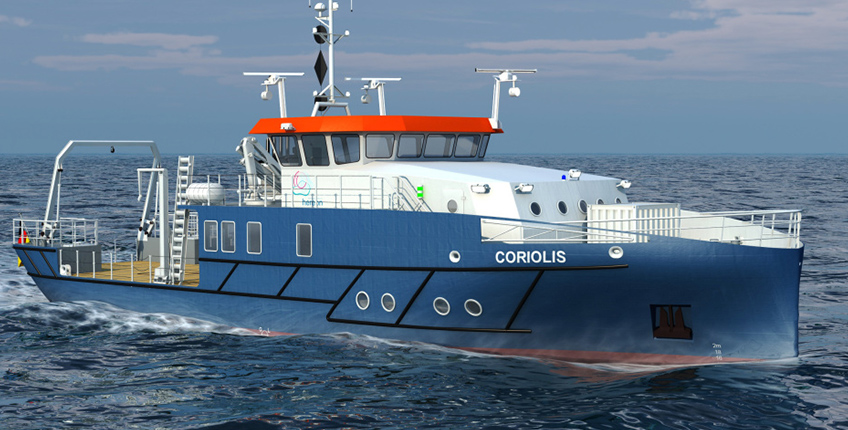The new research ship of Helmholtz-Zentrum hereon in Geesthacht is receiving a subsidy from the Federal Ministry for Digital and Transport (BMDV).
Under its BordstromTech II funding guideline, the Federal Ministry for Digital and Transport (BMDV) is supporting the procurement, testing and transfer of a hydrogen system laboratory for the generation of onboard power for the CORIOLIS, the future research vessel of Helmholtz-Zentrum hereon. The funding notification of over 560,000 euros (the project volume is 1.4 million euros) was presented by the Federal Agency for Administrative Services at the beginning of January. The technical review of the application was carried out by the National Organisation Hydrogen and Fuel Cell Technology (NOW), while the budget funds for the technological funding come from the Mobility and Fuels Strategy of the Federal Government (MFS).
Fuel cell and hydrogen storage system for the research vessel
The procurement of the fuel cell, the bunker station, the metal hydride tank as well as the control and regulation of the hydrogen storage system is the focus of the new project. The metal hydride tank for hydrogen storage was developed by Hereon and researched in its Institute for Hydrogen Technology. For many years, Hereon has conducted research on materials and systems for hydrogen storage and compression on the basis of metal hydrides, from the fundamentals of materials science to the storage system and application integration. The secure and compact, and thereby space-saving construction of the metal hydride tanks also has the advantage that hydrogen can be stored at moderate (50 bar) pressure and temperature conditions (operating temperatures in the tank -30 up to a good 50 degrees Celsius). In addition, the hydrogen is chemically bonded, making an explosive release impossible in the event of a tank accident.
The hydrogen onboard power system will fulfil a series of tasks:
- Supply the CORIOLIS with onboard power during the daily layovers in the North and Baltic Sea harbours (it is a ‘one-watch ship’)
- Supply the ship with onboard electricity during measurement campaigns in the North and Baltic Seas, including supply for the measuring devices, anchor pile, echo sounders, etc.
- Supply for the electric position control propellor (stern) and pump jet (bow)
- Supply for the main propulsion propellor (short-term operation)
Moreover, for research purposes, a 45 kW diesel generator is combined with a membrane module that has been developed by Hereon. Harmful NOx emissions from the diesel generator can therefore be almost completely eliminated. The drive concept is redundantly designed. The fuel cell, battery and generators can be combined with one another. The CORIOLIS is equipped with electric traction motors.
Climate-friendly sailing on the North and Baltic Seas
The scientific measurement campaigns of the research vessel for coastal research will be conducted in the North and Baltic Seas. Furthermore, the Ems, Weser and Elbe rivers will also be included. As a one-watch vessel, the CORIOLIS will always docked in a harbour overnight. The creates various opportunities to present the new and innovative generation of onboard electricity to potential users and increase acceptance. The results of the operation will be used to optimise the systems (bunker station, fuel cell, metal hydride tank, system control) and to simplify the retrofitting of sea-going and inland waterway vessels.
The research vessel CORIOLIS is currently being built at the Hitzler shipyard in Lauenburg. It will cover an interdisciplinary spectrum of coastal, materials, hydrogen and membrane research and thus is a research platform for the future of shipping. The overall costs amount to 18 million euros, shouldered by the federal government. The ship is to be christened this year.
Further information on the CORIOLIS can be found on the Helmholtz-Zentrum Hereon website.
Image: Hereon/Hitzler-Werft


